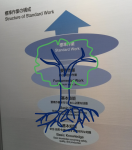What does organic thinking really mean in Organizational Development
When engineers face a quality problem, they tend to start with the last operation.
If something’s wrong with a part made of plastic components, the engineer will look at final assembly first, and make his or her ways backwards to find the source of the problem.
Twenty years ago, the old style Toyota sensei’s first question to us when encountering a quality issue was: “how much re-grind do you mix in your material compound?” The first step to problem solving was no re-grind in the plastic until quality was under control again, and then careful introduction (considering that regrind is the result of re-using bad parts, the less defects, the less regrind to reinfect in the mix).
“How would you grow the part?” a sensei once asked me.
Grow the part? It’s assembled! Put together. Made.
As Toyota explains in this poster in Toyota City:
- Standard work
- is the result of fundamental work: minimal work units
- which rests on basic skills: skills necessary for performing fundamental work
- which rests on basic knowledge: basic knowledge concerning safety, quality and production
This is an organic vision: sure, more and larger leaves get more sunlight, but without strong roots growing in rich soil, leaves are unlikely to grow green.

Managers are obsessed with standards. One thing they think they’ve learned from lean is to push harder for more standardized work. They are endlessly frustrated at the human pushback: “why can’t people just follow the standards?”
Because they deeply misunderstand that standard work is the natural result of knowledge of fundamental work, growing from basic skills, growing from basic knowledge. Developing standard work first means deepening basic knowledge of the impact of each work element on safety, quality and production.
An organic vision of Organizational Development is no hippie-new age “soft” skill issue. It is a very hard-nosed understanding that quality work is grown, not made, and that the role of managers is to tutor and support, not organize and control. Looking at the leaf pattern is fine and well, but let’s look to the roots as well.









